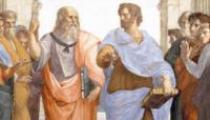Most instructed Catholics know that the essence of the New Law of Christ is:
to love God with all one's strength and to love one's neighbour for God's sake.
Christ tells us that he who truly loves God will carry out the will of God - indeed that obedience to God's will is the only sure test of our love for Him.
The Juridical Approach:
Deliberate disobedience is rightly seen as sinful, whether it be mortal sin or venial sin Here the Divine Will has to be clearly known as a set of precepts: e.g. the sins of calumny and detraction are offences against the Eighth Commandment. The juridical approach sees perfection to lie in the perfect avoidance of sin and the carrying out of obligations laid on us by God. Of course, such a life would be praiseworthy. But this view of the Christian life has several major problems, all alluded to by the great masters of theology and the spiritual life.
- (i) The Will of God is much more extensive and searching than the conventional analysis of precepts suggests, as we shall see.
- (ii) The Will of God requires an acceptance and a submission which sometimes involves outward activity, but often requires first and foremost an interior acquiesance.
- (iii) If we rely on our own strength, even on our tried and tested virtues, we will fail and fail repeatedly.
- (iv) In consequence, we must constantly seek God's help to know, to accept and to implement His Will.
- (v) This prayer of dependence on God's assistance implies an habitual union of the mind and will with God - hence, the habit of interior prayer must be acquired by continual exercise of interior, mental prayer until the soul lives in God's presence and her thoughts and desires return to Him as to her first love even in the midst of distracting labours.
What is the theological basis of submission to the Divine Will? All that God wills is good. God manifests His will in two ways:
- He manifests His signified will in the rules, precepts and counsels that He gives us - Here we are required to obey.
- He manifests His Will of Good Pleasure in the various events which He allows to occur in our lives - Here we must live in conformity with His will.
As love is the perfect form of virtue, so perfect submission actively and passively to the Divine will is the purest expression of that love. The doctrine of abandonment to the Divine will has seen a wonderful expression in the teaching of the masters of Catholic spirituality especially across the last 450 years.
Two Major Doctrinal Errors
But before we sketch this doctrinal richness we must look at two major errors against which the doctrine of abandonment was elaborated and refined. They are:
- Semi-Pelagianism
- Quietism
These two errors represent polar opposite deformations of the true doctrine.
Semi-Pelagianism
This error permeates modern Christian life, not usually as an explicit doctrine of grace but as a practical mind-set and mode of acting. In a mitigated version of the teaching of the British monk Pelagius (circa 354-420) against which the great Doctor of Grace, St Augustine, so vigorously fought at the end of his life, Semi-Pelagianism emphasizes man's ability to act virtuously and find salvation through his own efforts. It insinuates the baneful notion that we are the plenary causes of our own acts, both good and bad. Hence, the Semi-Pelagian takes major responsibility for his good works and for his successes and failures. About the latter he is often shattered and desolate. He vaguely acknowledges the role of grace and perhaps recognizes the causal role of Divine Providence - However, in Newrnan's terminology the assent is notional at best, never real. The Semi-Pelagian profoundly dislikes the apparent obscurity of God's plans. He wants clear active goals! And he is happiest when he is working towards clear goals, especially when he can see “good fruits" and outcomes which are agreeable to his mind.
But it is theologically certain that
- (i) many of the dispositions of Divine Providence are obscure to us either temporarily or often for as long as life lasts "in via peregrinationis - otherwise God would not be God.
- (ii) God acts supremely in the realm of grace, that is in the interior realm. Here are carried out His greatest acts.
- (iii) Consequently, His chosen and best instruments are aware of these truths and are grace-filled and grace-directed.
Thus Mary said:
"Ecce ancilla Domini! Fiat mihi secundum verbum tuum" - "Behold the handmaid of the Lord Be it done unto me according to Thy word"
Quietism
The Spaniard, Miguel Molinos (16281696) spread his quietist teaching in Rome, until his condemnation in 1687. He taught that perfection consists in absolute passivity of soul, which when acquired is beyond virtue or vice because God alone acts. No acts of the soul are required, not even resistance to temptations, because these and any associated physical acts committed are the Devil's doing and a trial! Immeasurable damage to the diffusion of the true doctrine of prayer and the contemplative life resulted from:
- (a) the spread of Semi-Quietism in the late 17th century and early 18th century, especially in France, and
- (b) the over-reaction against it throughout the Church.
The saintly Archbishop Fenelon and his spiritual daughter, Madame Guyon, were attacked by Bossuet and condemned, (reluctantly), by Innocent XII in 1699. Fenelon submitted immediately, but the harm was done. Fenelon's chief error was to promote a passivity in which "pure love" excluded even the hope of salvation: God for Himself alone.
But the virtue of hope is of the essence of true abandonment. Sometimes God may ask us to follow Abraham's example as cited by St Paul, when in submission to God's apparent will in regard to Isaac, "in hope he believed against hope” (Rom. 5:18).
The True Doctrine of Abandonment
The diagram below illustrates the spiritual lineage of the doctrine of abandonment to God's holy will through some of its major exponents.
 De Caussade in typically radical fashion says:
De Caussade in typically radical fashion says:
"It is by union with His will that one enjoys and possesses God and it is an illusion to seek for that enjoyment by any other means. The will of God is the universal means." (Self-Abandonment to Divine Providence)
De Caussade had absorbed the teaching of St Francis de Sales and of St John of the Cross. His teaching was in the main given to nuns of the order founded by St Francis and by St Jane de Chantal the Order of the Visitation of Holy Mary. The profound doctrine of de Sales on Abandonment is to be found in his great Treatise on the Love of God especially in Books 8 and 9 ("Concerning the love of conformity..." and "Concerning the love of submission...") and in his spiritual letters (which are a gold mine). De Caussade's own collected Spiritual Letters likewise contain great treasures of doctrine. His famous short treatise on Self-Abandonment is, in fact, a compilation made from his spiritual conferences to Visitation nuns and was only finally published by a fellow Jesuit in 1861. Kitty Muggeridge's recent translation is based on a new critical edition.
The Sacrament of the Present Moment
St Francis de Sales, St Alphonsus Liguori. and De Caussade all make it clear that God manifests himself under the veil of the Duties of the Present Moment. Here is the sovereign resolution of the apparent conflict between passivity and activity. We must embrace His will now. And now is when grace is available to us. St John of the Cross's doctrine of active and passive purgation of the memory is of great significance here, as is the doctrine of his spiritual daughter, Therese concerning hope and trust even in the midst of our weakness and frailty. We squander the gift of God Himself in the present by our disordered preoccupations with the past and the future.
Mother Teresa of Calcutta was a shining exemplar of the sacrament of the present moment. United interiorly with God in unceasing prayer, she serenely moved from duty to duty, from person to person. From God in silent mental prayer before the Blessed Sacrament, to God in her importunate visitors, to God 'In her importunate correspondents, to God in her own fatigue, exhaustion and illness, to God in her sick and dying patients.
What unified all these acts?
Love which seeks the Beloved, in what He wants, which trusts Him in Hope and Which pierces the veil to know Him in Faith. As a teacher of abandonment, Dom John Chapman OSB is a master of lucidity and practicality. For example in a letter to Algar Thorold the English translator of De Caussade, he says:
"...In the case of any ... pious person ... the proper thing is (1) to pray for guidance, (2) to act for the best, (3) to say that we have done God's will, even if (a) we find that we had decided wrongly or (b) that (anyhow) the result is wrong." (Spiritual Letters #XXV)
"Fiat voluntas tua!"




